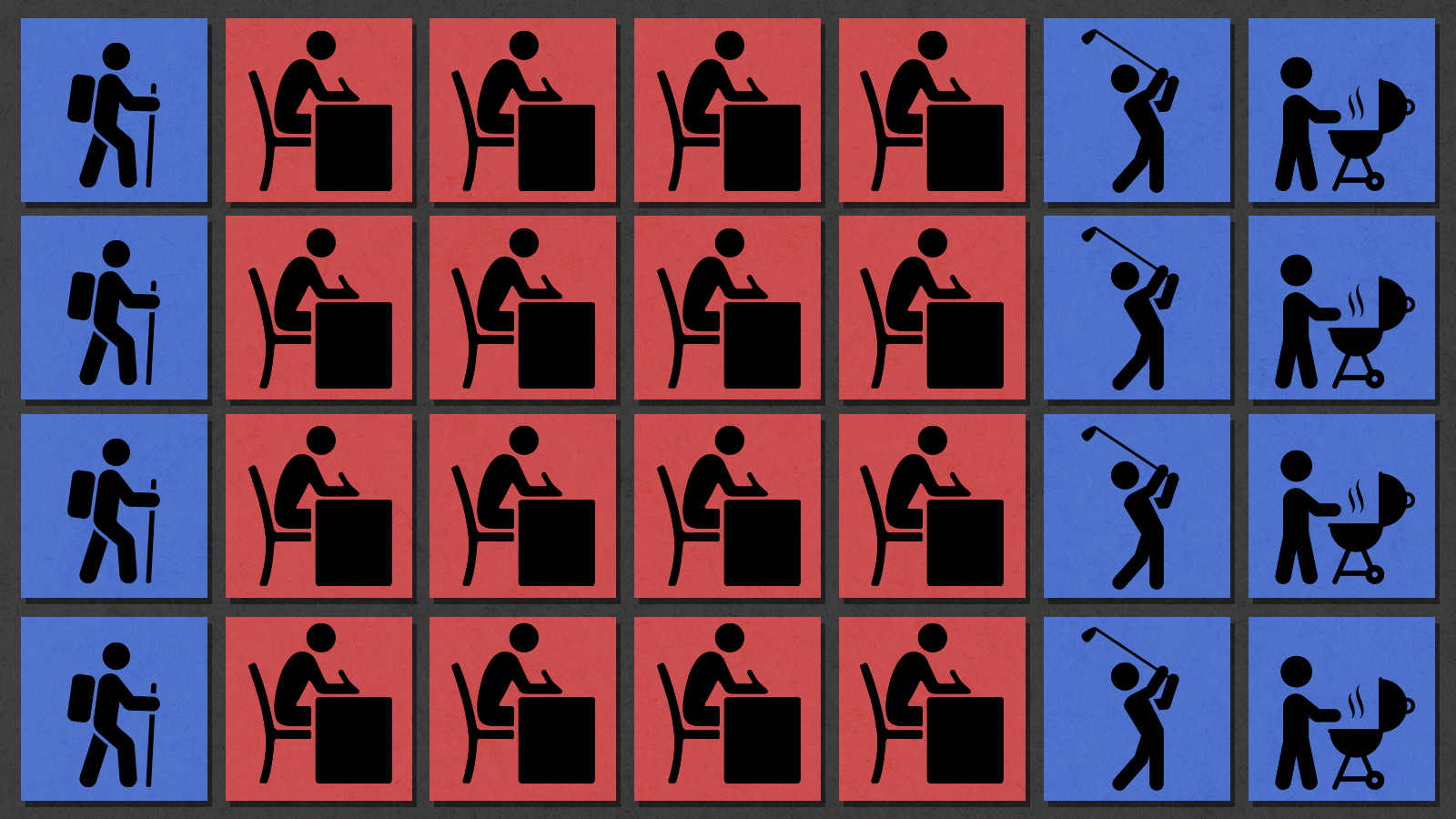Why the 4-day workweek is still controversial
The sharpest opinions on the debate from around the web


A free daily email with the biggest news stories of the day – and the best features from TheWeek.com
You are now subscribed
Your newsletter sign-up was successful
The United Kingdom on Monday launched the world's largest pilot of a four-day workweek, in which over 3,300 workers from 70 companies will work "80 percent of their hours for 100 percent of their pay," provided, of course, "they commit to maintaining 100 percent productivity," The Washington Post explains. Even in the U.S., the push for a shorter workweek is nothing new, having been an office pipe dream for decades — in 1956, in fact, then-Vice President Richard Nixon mused that such an adjustment would come in the "not too distant future." Here's a quick look at the state of the debate on the matter:
Productivity is unchanged
The main argument for a four-day workweek centers around its supposed lack of effect on worker productivity, columnist Karla L. Miller wrote for the Post back in February. Humans tend to fill the amount of time available to them when completing a task, meaning if workers knew they only had four days (rather than five) to finish a project, they would just streamline their habits and processes accordingly. If an employee can get the same amount done in a shorter amount of time, where's the harm in reducing total time on the clock?
Not to mention that "minds and muscles can function for only so long before fatigue kicks in and starts affecting long-term health," Miller added. A longer workweek can lead to "stress-induced damage" like high blood pressure and irregular heartbeats — and what good is that for productivity?
The Week
Escape your echo chamber. Get the facts behind the news, plus analysis from multiple perspectives.

Sign up for The Week's Free Newsletters
From our morning news briefing to a weekly Good News Newsletter, get the best of The Week delivered directly to your inbox.
From our morning news briefing to a weekly Good News Newsletter, get the best of The Week delivered directly to your inbox.
"[I]t's clear we need to rethink how we allocate our time, individually and as a society," Miller argued. "After decades of increased automation and innovations that let us work ever more efficiently, why are we still trying to wedge more productivity into the time we've supposedly saved?"
The real benefit is on workers as people
To frame the 4-day workweek debate through the lens of productivity is "disappointingly narrow" and wrong, Post columnist Christine Emba mused last summer; rather, a shorter workweek should be seen as a chance to embolden employees to become "fuller people," not better workers.
Following an "admittedly unscientific" Twitter poll of her own design, Emba concluded that workers view a four-day work week as an opportunity to do more of the things "that make them … themselves," she wrote. "Some wanted to pursue a skilled pastime that would enrich their lives, such as playing an instrument or making art," and "others thought they would spend the extra day with their friends and families," she said of the poll's respondents. There was even talk of "going to museums, taking walks, spending time at church."
Though such hobbies and activities "are unlikely to be recognized as creating economic value," they are "obviously rich in human value," Emba continued. And that deserves to be appreciated, as well.
A free daily email with the biggest news stories of the day – and the best features from TheWeek.com
Remember that it's about hours, not days
Wherever the debate lands, it should be remembered that a shortened workweek should not be structured so as to cram roughly the same amount of hours into fewer days; rather, a four-day workweek should mean decreasing total hours on the clock, Sarah Green Carmichael posited for Bloomberg.
"The four-day week is a worthy management experiment," Green Carmichael wrote. "But to truly make it successful, companies have to shrink the workweek, not shift it." CEOs, executives, and businesses must keep that in mind before "cramming a 40-hour schedule into four days," because "long work days are taxing, even if they are followed by long weekends."
Focusing on hour reduction might actually prove beneficial for jobs requiring "sustained deep concentration," Miller wrote for the Post back in February. "Research has found that for tasks requiring sustained deep concentration and a state of 'flow,' more time does not produce deeper or better-quality thinking." For roles like that, Miller posits, perhaps employers should structure shifts in six-hour increments, instead.
But maybe this isn't as flexible as we think
The U.S. workforce is already giant and complex — "to overlay a 32-hour workweek on such an amalgam of business activity is like entering a room crowded with furniture and then turning off the lights," Brent Orrell, senior fellow at the American Enterprise Institute, argued in U.S. News & World Report.
If employers had to pay workers overtime after only 32 hours of work, it would "impose significant financial burdens on employers and create new barriers and rigidities in scheduling and working arrangements," Orrell added. Such an arrangement could actually cut "against the worker priority for schedule flexibility and the complexity of the economy itself."
And speaking of scheduling, there's also the problem that, well, not every company could do this. Take healthcare employers for example; they "wouldn't be able to function if employees were able to decide to work four days one week and five days the next," Chris Van Gorder of Scripps Health told The San Diego Union-Tribune. "While health care employers do offer a four-day, 10-hour-day workweek to some employees, the option to change that regularly would create a scheduling nightmare for health care and other 24/7 businesses."
Brigid Kennedy worked at The Week from 2021 to 2023 as a staff writer, junior editor and then story editor, with an interest in U.S. politics, the economy and the music industry.
-
 The ‘ravenous’ demand for Cornish minerals
The ‘ravenous’ demand for Cornish mineralsUnder the Radar Growing need for critical minerals to power tech has intensified ‘appetite’ for lithium, which could be a ‘huge boon’ for local economy
-
 Why are election experts taking Trump’s midterm threats seriously?
Why are election experts taking Trump’s midterm threats seriously?IN THE SPOTLIGHT As the president muses about polling place deployments and a centralized electoral system aimed at one-party control, lawmakers are taking this administration at its word
-
 ‘Restaurateurs have become millionaires’
‘Restaurateurs have become millionaires’Instant Opinion Opinion, comment and editorials of the day
-
 The 8 best superhero movies of all time
The 8 best superhero movies of all timethe week recommends A genre that now dominates studio filmmaking once struggled to get anyone to take it seriously
-
 Josh D’Amaro: the theme park guru taking over Disney
Josh D’Amaro: the theme park guru taking over DisneyIn the Spotlight D’Amaro has worked for the Mouse House for 27 years
-
 The best fan fiction that went mainstream
The best fan fiction that went mainstreamThe Week Recommends Fan fiction websites are a treasure trove of future darlings of publishing
-
 Golden Globes affirm ‘One Battle,’ boost ‘Hamnet’
Golden Globes affirm ‘One Battle,’ boost ‘Hamnet’Speed Read Comedian Nikki Glaser hosted the ceremony
-
 ‘One Battle After Another’ wins Critics Choice honors
‘One Battle After Another’ wins Critics Choice honorsSpeed Read Paul Thomas Anderson’s latest film, which stars Leonardo DiCaprio, won best picture at the 31st Critics Choice Awards
-
 The best alcohol-free alternatives for Dry January
The best alcohol-free alternatives for Dry JanuaryThe Week Recommends Whether emerging from a boozy Christmas, or seeking a change in 2026, here are some of the best non-alcoholic beers, wines and spirits to enjoy
-
 13 Gen Z workplace terms and phrases
13 Gen Z workplace terms and phrasesin depth From ‘quiet firing’ to ‘resenteeism,’ there are clues about why employers and employees in America are having such a sad time
-
 Let these comedians help you laugh your way through winter
Let these comedians help you laugh your way through winterThe Week Recommends Get some laughs from Nate Bargatze, Josh Johnson and more
